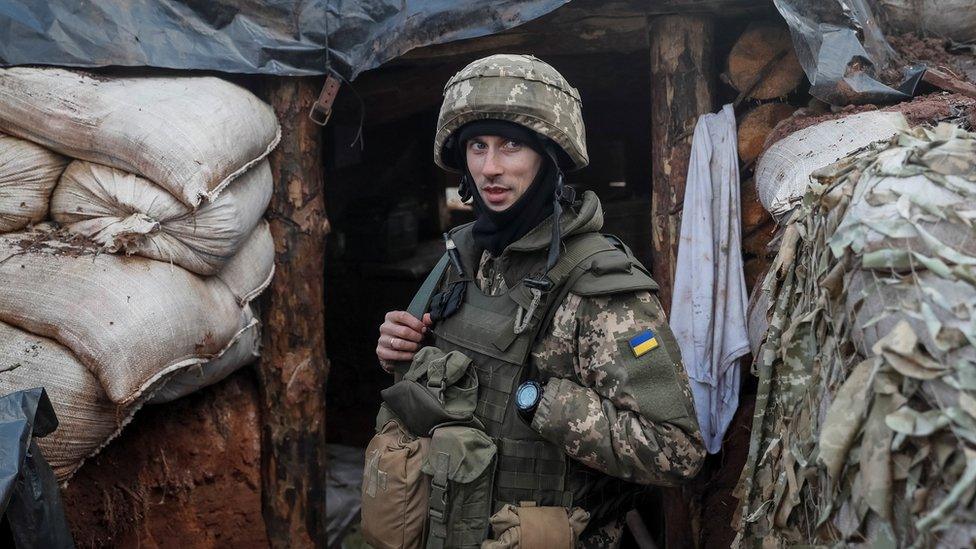Ukraine-Russia: Putin mulls recognising independence of breakaway regions
- Published

A Ukrainian soldier on the frontline in Donetsk, one of two breakaway regions in eastern Ukraine
Russia will decide today whether to recognise the independence of two breakaway regions in eastern Ukraine, President Vladimir Putin has said.
Russian-backed rebels have been fighting Ukrainian troops in Donetsk and Luhansk since 2014, with regular violence despite a ceasefire agreement.
Leaders of both regions asked Russia to recognise their independence on Monday.
But Western powers fear such a move could be used as a pretext for Russia to invade its neighbour.
Since 2019, Russia has issued large numbers of passports to people living in the two regions.
Analysts say that if the two regions were recognised as independent, Russia might send troops into Ukraine's east under the guise of protecting its citizens.
Russia has built up more than 150,000 troops on Ukraine's borders, a move which has widely been seen by Western nations as preparation for an imminent invasion. Russia denies any such plans.
Mr Putin will give a televised address to the nation on Monday evening, according to Russian media, but no exact time has been given.
At a televised meeting of the Russian security council on Monday, Mr Putin said he was considering recognising both breakaway regions as states.
"The objective of our meeting today is to listen to colleagues and decide on our next steps in this area," Mr Putin said.
"I mean both the appeal to Russia made by the heads of the Donetsk People's Republic and the Luhansk People's Republic for the recognition of their sovereignty," he added.
Several officials at the council meeting spoke up in favour of the move, and the Russian parliament has already asked Mr Putin to recognise their independence.
But the Russian President did not indicate his final decision, saying it would be made later Monday.
This was a piece of theatre in which everyone had their allotted role and script.
Russia's most senior officials sat in an awkward-looking semi-circle before Vladimir Putin, and were called upon one by one to tell him what he wanted to hear.
In the story they spun, Russia was being compelled to step in to protect the people of the Donbas - many of them now Russian citizens - from the deadly threat posed by Kyiv, by giving formal recognition to the breakaway regions. The word genocide was uttered again; Ukraine's government described as puppets of the West.
Some played their part with more gusto than others. At one point, a dry-mouthed and stumbling intelligence chief strayed off script and declared his support for incorporating the breakaway regions into Russia. He was corrected like an errant schoolboy by President Putin.
The actual decision - which would end any peace talks with Kyiv - hasn't been announced yet. In a final flourish, Vladimir Putin said he would first mull over what he'd heard, then make his call.
Which sounded rather like a challenge to the US to try and stop him.
The move came amid a day of claim and counter-claim by Russia and Ukraine about events on the frontlines of the contested region.
In Donestk and Luhansk, the Russia-backed rebel groups have been locked in an uneasy ceasefire with Ukrainian forces since 2015 with frequent violations.
International monitors report a "dramatic increase" in attacks along the line dividing rebel and government forces. Two Ukrainian soldiers were killed and four injured by shelling on Saturday, the first deaths to be reported in weeks.
The rebels, meanwhile, have alleged casualties on their side, including at least one civilian, and Russia has evacuated some women and children from the regions to Russian soil.
Moscow and the separatist rebels have claimed Ukraine is planning an assault to retake the areas, but this has been dismissed by both Kyiv and the West.
Watch: Amid fears of a Russian invasion, families in Ukraine are worried they will have to flee for a second time
Russian military officials said they had killed five Ukrainians who crossed into Russia's territory from Ukraine, and that one Ukrainian soldier had been captured. Russia also claimed that one of its border crossing posts had been destroyed by shelling from Ukraine.
The allegations prompted Ukrainian Foreign Minister Dmytro Kuleba to take to social media and accuse Russia of carrying out a wider disinformation campaign.
"Russia, stop your fake-producing factory now," he wrote.
Allow Twitter content?
This article contains content provided by Twitter. We ask for your permission before anything is loaded, as they may be using cookies and other technologies. You may want to read Twitter’s cookie policy, external and privacy policy, external before accepting. To view this content choose ‘accept and continue’.
Earlier, US President Joe Biden agreed "in principle" to hold a summit with Mr Putin.
The hoped-for talks were brokered by the French presidency after two lengthy phone calls with Mr Putin, but have not been confirmed. The Kremlin then sought to downplay the likelihood of any summit, saying there were no "concrete plans".
However, US Secretary of State Antony Blinken and his Russian counterpart Sergei Lavrov are due to meet for talks later this week as attempts to find a diplomatic solution continue.
Related topics
- Published21 February 2022
- Published21 February 2022
- Published11 March 2022
- Published10 October